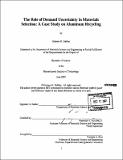The role of demand uncertainty in materials selection : a case study on aluminum recycling
Author(s)
Dabbas, Hashem H
DownloadFull printable version (2.612Mb)
Other Contributors
Massachusetts Institute of Technology. Dept. of Materials Science and Engineering.
Advisor
Randolph E. Kirchain, Jr.
Terms of use
Metadata
Show full item recordAbstract
Aluminum is a versatile material that is used frequently in transportation and packaging, two industries with substantial recent growth. The increase in demand for aluminum, however, has outpaced the growth of primary aluminum production. One way to meet this shortfall is the use of secondary, or recycled, materials which provides both economic and environmental benefits. The increased use of secondary materials is limited by numerous factors; one such factor of concern is uncertainty. One form of uncertainty that all producers face is consumer demand; this will be the focus of this study. The two stage recourse optimization model presented in this thesis aims to provide batch planners with a tool to effectively manage raw materials in an uncertain demand environment. This model enhances existing research by increasing the number of demand scenarios considered by an increase in the model's resolution. The two metrics evaluated are scrap purchased and production cost. The batch planning process is affected by a number of assumptions about factor inputs including the model resolution, salvage value, coefficient of variation, scrap cost and compositional constraints. Results show that understanding the influence of these factors provides producers with the insight and ability to effectively manage and mitigate the effects of demand uncertainty in a cost minimization framework.
Description
Thesis (S.B.)--Massachusetts Institute of Technology, Dept. of Materials Science and Engineering, 2007. "June 2007." Includes bibliographical references (leaves 53-54).
Date issued
2007Department
Massachusetts Institute of Technology. Department of Materials Science and EngineeringPublisher
Massachusetts Institute of Technology
Keywords
Materials Science and Engineering.